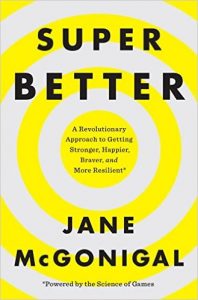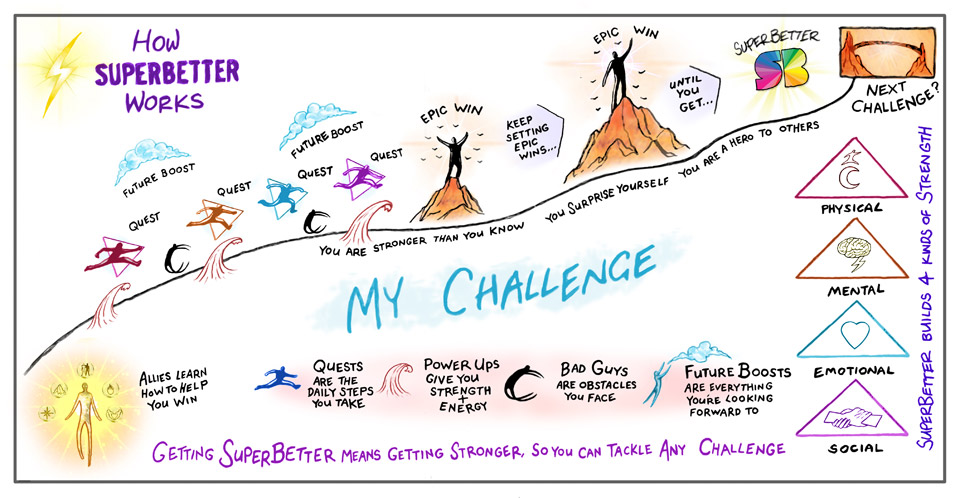We ask parents to teach their child, but it’s not that simple. Overcoming your child’s dyslexia is a marathon, a daily grind of drills, patient practice, slow progress, and frequent setbacks. You need extraordinary resilience to succeed. Your child is going to push back, there will never be enough hours in the day, and you face endless interruptions and competing priorities. Miss a day and your child will forget and have to be taught again.
Honestly, it’s hopeless. You know there is nothing wrong with your child, you understand the urgency and importance, but repairing his poor reading skills is overwhelming. It’s too much to even consider. You just don’t have the strength.
But what if it was a game?
The Power of Games
Jane McGonigal gave this amazing TED talk back in 2010 about the power of games.
Games like World of Warcraft give players the means to save worlds, and incentive to learn the habits of heroes. McGonigal asked “What if we could harness this gamer power to solve real-world problems?”
Then McGonigal suffered a concussion. Struggling to heal, she decided to take her own medicine and wrote a resilience-building game called SuperBetter. Nearly half a million people have used it so far to achieve personal growth and tackle real-life challenges. McGonigal followed up by publishing a thought-provoking book with the same title explaining her design decisions and citing supporting research.
The techniques of this game can be applied to almost any personal goal requiring small committed steps over a long period: losing weight, overcoming depression, earning a PhD.
 Here’s the basic idea: “Live Gamefully”. Accept the game challenge. Set out on Quests. Give yourself Powerpacks. Enlist Allies and conquer Enemies. Adopt a Secret Identity and find a Heroic Story. Work towards an identifiable ‘Epic Win’.
Here’s the basic idea: “Live Gamefully”. Accept the game challenge. Set out on Quests. Give yourself Powerpacks. Enlist Allies and conquer Enemies. Adopt a Secret Identity and find a Heroic Story. Work towards an identifiable ‘Epic Win’.
McGonigal asks us to overcome our obstacles by adopting a “Challenge Mindset”, and to build up our resilience by treating obstacles to our most-desired goals as if they were simply game-elements to be overcome. To play our lives as a game.
Jane’s insight is to make the challenge mindset explicit in our training plans. Your swollen right knee hurts and you are miserable? OK, try to make breakfast without a single step on that leg. Call yourself the left-legged breakfast-bandit. Extra blueberries if you succeed. Challenge your partner to make breakfast only with his right leg. Suddenly it’s a game, and you are a hero.

The Parent’s Journey
There may be real obstacles and hardships in your life, overwhelming stuff that is out of your control. Some things cannot be overcome with determination and a positive mental attitude. Sometimes only thing you can control is how you react, how you behave, how you think about those obstacles.
The first step is understanding the “Challenge Mindset”, and it’s ugly brother, the “Threat Mindset”. There are two questionnaires in this blog, adapted from McGonigal’s book, that can help us.
Please take a minute and mark your answers to the survey. Yes, we know you can just read the questions, but treat it as a game – take the extra few seconds to follow the artificial rules. It’s our first challenge to you.
You probably noticed that all the questions were about YOU. Do you feel a little more excited about this project?
Now do the same for the “Threat Mindset”. We haven’t talked about this yet, but you will figure out what a Threat Mindset means as you work through the questions. Again, take the extra time to click on the buttons.
A Custom Game for Parents
A problem with SuperBetter is that it is not specifically about teaching reading. Our project would be better served if the Quests and Challenges were relevant to teaching our child, if the daily “To Do” list integrated seamlessly with the lesson plans, and our Allies knew something about dyslexia and tutoring.
It should be possible to build supports for the Challenge Mindset into the Community Reading Project software. Would anyone be interested in using it? Does anyone want to help design and test something like this? Perhaps comment in our Facebook group.




Leave a Reply